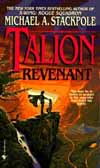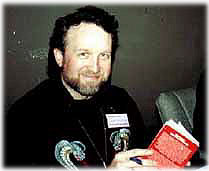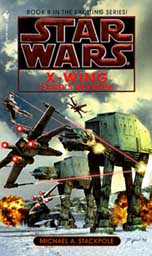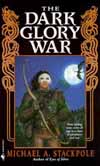

Part 3 of 3
Please note: There are discussions of topics from the New Jedi Order series contained in this interview that may be considered spoilers by some readers.
 TheForce.Net has been lucky enough to speak to many of the authors of the Star Wars Extended Universe, and admittedly, one of our favorites is Michael A. Stackpole. The author of several books and comics, Mike is always generous with his time and effort to reach out to fans. We last spoke to Mike in November of last year, and you can read that interview here. Once again, TheForce.Net's Helen Keier has a few questions for Mike.
TheForce.Net has been lucky enough to speak to many of the authors of the Star Wars Extended Universe, and admittedly, one of our favorites is Michael A. Stackpole. The author of several books and comics, Mike is always generous with his time and effort to reach out to fans. We last spoke to Mike in November of last year, and you can read that interview here. Once again, TheForce.Net's Helen Keier has a few questions for Mike.
Recent months have seen the publication of Mike's Dark Horse Comics' UNION series, in which Jedi Master and perennial bachelor Luke Skywalker marries Mara Jade. Also, more recently from Del Rey, Mike has two books in the NEW JEDI ORDER series, DARK TIDE: ONSLAUGHT and coming in June 2000, DARK TIDE: RUIN.
We appreciate Mike making the time to chat with us. You can visit Mike's website at http://www.stormwolf.com/.
In Part 1 of this interview we talked about Dark Tide: Onslaught, Corran Horn, and some of what is to come in Dark Tide: Ruin. Part 2 discussed Ruin, Wedge, what it is like to write a Star Wars novel, and some thoughts on interacting with fans. Also, Mike gave us a hint about an interesting idea that was pitched to Dark Horse comics. Here in Part 3 we talk about what is coming up for Mike - why Dark Tide: Ruin is his last star Wars novel, about some of his other books that may interest his Star Wars readers and why, and what books we may see from him in the future.
On with the part 3 of the interview!
TFN: You've mentioned above and explained on your web site why Ruin will be your last book. What can you tell us about that? What brought you to this decision?
MAS: As the essay points out, the key point in this decision is simple: you can only write in the SW universe by invitation, and Del Rey's dance card is filled right now. However, that's probably just as well because I don't want to burn out on Star Wars. Just as Star Wars provided me a respite from BattleTech for a while, letting me go back there fresh, it's time for me to do some other things that will keep me fresh for Star Wars if I get asked back.
TFN: What kind of challenges are you looking for?
MAS: I'm looking for the challenges I think every writer should look for: how do I become the best novelist I can be? In my case I think this will be involved in exploring more genres. I can do SF, I can do fantasy, now I need to see if I can do Mysteries. Doing that is the sort of thing that fills me with the same dread I had in writing comics for the first time. I remember, when sending the first script off to Peet Janes, having flop sweat. I mean, that was the first time I'd had that sort of apprehension in forever. Oddly enough, it felt kinda good because I knew I was taking a risk. And if you're not taking risks, you're not pushing yourself to be better.
I once had a reader tell me, "When I see your name on a book I'm never quite sure what I will get, but I know I will like it." That's the kind of sentiment I like, and something I feel called upon to honor. With each of my books, I want the reader to get his money's worth, and then some. Doing the same old thing others do holds zero interest for me. I want readers to be swept up in a book, feel hard pressed to put it down, then, when it ends, wonder where the time went.
There are other projects I want to work on. The whole nature of the net and how it will change publishing intrigues me. This is something I need to explore a lot more.
TFN: What kind of things are you thinking about doing? Anything in the works?
MAS: There are constantly things in the works, but I have a personal thing against talking about the speculative stuff until it becomes more concrete. Once some things are in writing, contracts have been inked and the like, then I'll talk about it. Any announcements or anything like that will show up on Stormwolf.com, so that would be the place to watch.
TFN: Many readers discovered you through Star Wars. What would you recommend to those who now want to read your other works? Where should one start? Why these selections?


MAS: Three of my fantasy novels: Once a Hero, Talion: Revenant and The Dark Glory War pretty much top the list of books folks point to when asked what my best work is. In the BattleTech arena the place to start is Warrior: En Garde, the first novel I did for them. Why those books per se? Well, I was certainly hitting on all cylinders when writing OAH. That book still has pieces that amaze me in it. Talion: Revenant was my first novel and, had it sold back in 1986 when written, chances are I'd never have done any Star Wars novels. It was a book I was writing without a contract, just to put together a story that would compel someone to pay me to write more. And The Dark Glory War, well, it's where I get to apply everything I've learned writing for BattleTech and Star Wars and in my own fantasy stuff. It's the first of four and in it I get to do some stuff I'd always wanted to do, so I am very pleased with it.
TFN: What would you say you've learned writing for BattleTech and Star Wars?

MAS: A number of things that I already knew, but had reinforced. The first is that folks are always suckers for a good love-story/romance. Readers will say they like Btech or the X-wing books because of the action, but they always want to know how the relationships turned out. Poor Gavin's predicament at the end of Isard's Revenge left a lot of folks feeling sad.
Characters are king, so make sure you get them right and make them real. Action can provide elements of pacing, but doesn't substitute for a lack of plot or pacing. If you don't know and love the universe as much as your readers, they'll know it and they'll never touch another thing you've written. And, ultimately, if you screw up, it's your name on the book, so you have to do everything you can to make sure that book is the best book you can turn out, bar none.
TFN: With the DragonCrown War series you're creating a new fantasy series. What can you tell us about it?

MAS: Forever and a day I've loved the work of authors like JRR Tolkien, Stephen R. Donaldson and Dennis L. McKiernan. For years I never thought I could write anything that epic in scope or that rich. Back in 1997 I started thinking hard about that epic fantasy genre and was able to break things down into all the elements that those stories really require to make them work. I said to myself, "Hey, I can do that." AND I looked at how I could do them in new and different ways. AND I looked at all the other cool stuff I could bring to a series. So, I sat down and planned out this epic fantasy novel arc.
TFN: What did you feel were the elements required to make those stories work? How so?
MAS: To fully answer that question would be like me being a professional football coach and putting my entire playbook here for everyone to look at. Not gonna do it. I can provide an example, however... In Star Wars, and Lord of the Rings, Stephen R. Donaldson's Thomas Covenant stories, the Wheel of Time and Dennis L. McKiernan's Mithgar books; we have protagonists who are all fairly innocent about the world around them. Luke, the hobbits, McKiernan's warrows and Jordan's heroes are all farmers -- tugging on the good-hearted innocence of stout farming stock (from a time before we had agro-combines). That's a standard motif we see in epic fantasy. Donaldson pulls a variant of that by having Thomas Covenant come from our world and go into the fantasy world where the story takes place. As a storytelling device, the innocence of the character allows the reader/viewer to see the world new through his eyes, and learn about it as he does.
I capture the innocence/ignorance part of the characters -- they don't know the world around them, but this does not mean they need to be farmers. In THE DARK GLORY WAR we have four young men trained to be warriors who go off and learn how horrible war can be. In FORTRESS DRACONIS we start with Will, a young man who is a thief. His world if you will, is a city neighborhood -- plants are those things rich folks grow behind garden walls. He's ignorant of the world at large, but comes with a skills set your average turnip-rancher just doesn't have.
So, anyone reading up on epic fantasy would probably be able to pull the same elements I did and figure it all out. I added other things -- folklore motifs not commonly used, or variations on themes -- and have had great fun in working on this epic.
I'm not going to kid myself or anyone else: Tolkien, Donaldson and McKiernan are the Babe Ruth, Lou Gehrig and Joe DiMaggio of epic fantasy. Me, I can be one heck of a utility infielder in that league, maybe even a starting shortstop. The fact is that these books are pushing me to do the best job I can and then some, and I'm having so much fun doing them that I know it comes through in the books. The DragonCrown War will be a heck of a ride and if readers have liked any of my other material and have even a vague interest in fantasy, they'll love these books.
TFN: You mention on your web site that your work in the Battle Tech series helped with your Star Wars novels. That's a pretty good reason for the Star Wars reader to take a look at these books. Can you fill us in on the BattleTech novels? What in the Battle Tech line will appeal to Star Wars readers?
MAS: BattleTech is a game involving combat between giant piloted war machines -- anthropomorphic robots, mostly. It has a very rich and involved political background, which I've been helping craft since 1987, when I first started writing for the line. Since then we've covered 40 years of universe time, with the political landscape shifting incredibly, an invasion from outside having come in and been dealt with and, even now, internal pressures are poised to shred the universe. The stories I write tend to be the core histories, the books that move the arrow of time along.
As for what will appeal to Star Wars readers, well, there's romance, action, politics, humor and great characters. No Jedi, but there is some mysticism tossed in there and a lot of very nasty back-biting and double-dealing that means you can never quite be sure what's going to happen. I think Star Wars readers will see some of the antecedents of things they love about my SW novels, and also see some of the stuff that just wouldn't fit in a Star Wars novel. In short, they'll be familiar enough for the readers to feel comfortable; yet have twists and turns enough to pull you through the dozen novels I've done in the line. (The line also features novels by Loren Coleman, who is a very good writer and well worth reading.)
TFN: You've had enormous professional success with Star Wars. On a personal level, what are you taking away with you as a result of your time with Star Wars?
MAS: Working with Star Wars is really a sacred trust. There is this universe and these characters that everyone loves and you get to work there and play there. And the readers are trusting you that you'll do a good job, even a great job. The kindness folks show you when you hit that mark, well, it's hard to imagine anything nicer. People have just been wonderful to me because of my work here and that's something that will stick forever with me.
TFN: What are you leaving behind?
MAS: Piece of my soul, piece of my heart. You know, being a professional you know, on a very basic level, that writing these books is a job. But Star Wars is just so powerful a place, has had so much effect on the world, it's just everywhere. I couldn't just approach it as a job, so I put six years of my creative life into it, with no regrets at all, and have gotten much more out of it. Now, well, I'll be like the kid on the outside of the toy store looking in. It's a little bittersweet, but only a little because of all the great memories.
TFN: Do you have any particular memories that stand out?
MAS: Try to pick out any one or two memories, and dozens just come flooding in, giving me goosebumps. Like the letter I mentioned from a young man at University, how can you forget that. And being invited to a convention in Australia and having everyone be so nice. That trip had LOTS of great memories, but probably the standout was the "New Star Wars vs Old Star Wars" debate on the last day of the convention. I still giggle when thinking about that. Seeing folks at conventions wandering around in costumes as some of the characters I've created. Being voted the #1 comic writer for Star Wars, boy, that was a stunner; and hitting the New York Times Bestseller list for the books, you can't forget that. And visiting Skywalker Ranch, wow!
Basically, Star Wars has been part of my life since 1994 in a professional sense, part of it overall since 1977. And it will continue to be part of my life, which is very cool. By the same token, as a counterpoint, twice during that time I've been on planes when they call for a doctor on board because a passenger is feeling ill. As much as I love what I do, as much as I have these great memories, I'd pitch them all to be able to answer that call in those times. Though folks may not want to believe it, Star Wars is part of our lives, not the entirety of our lives. I cherish the part of my life it is, but I cherish the rest of life, too.
Part 1 of this interview can be read here.
Part 2 of this interview can be read here.